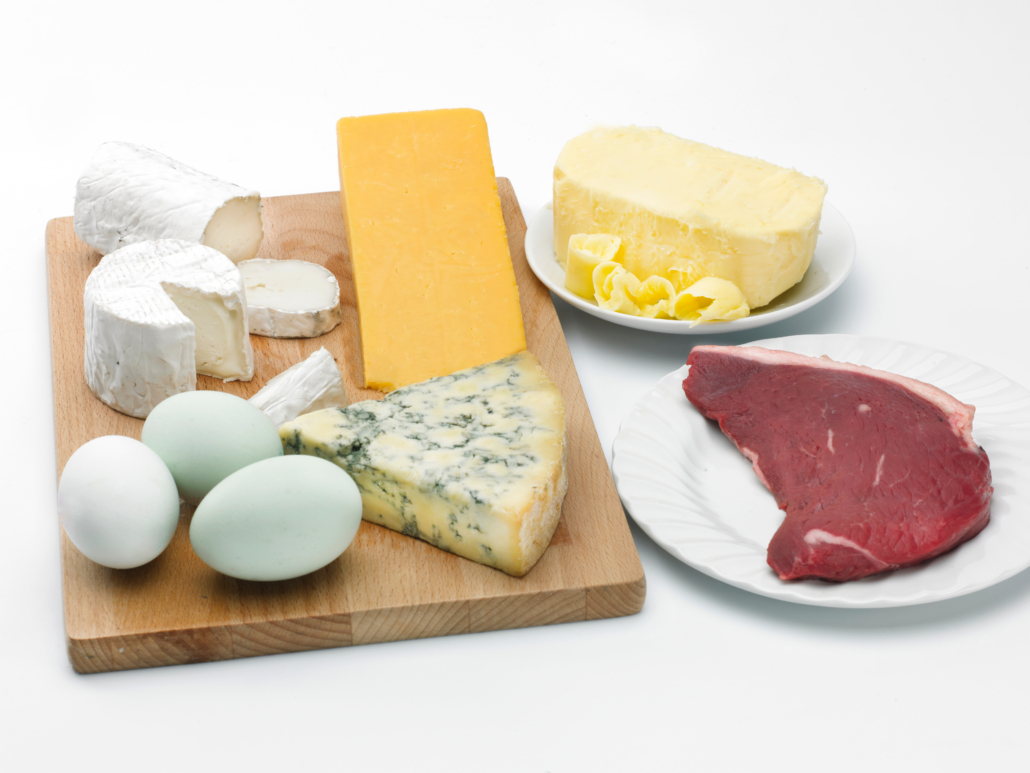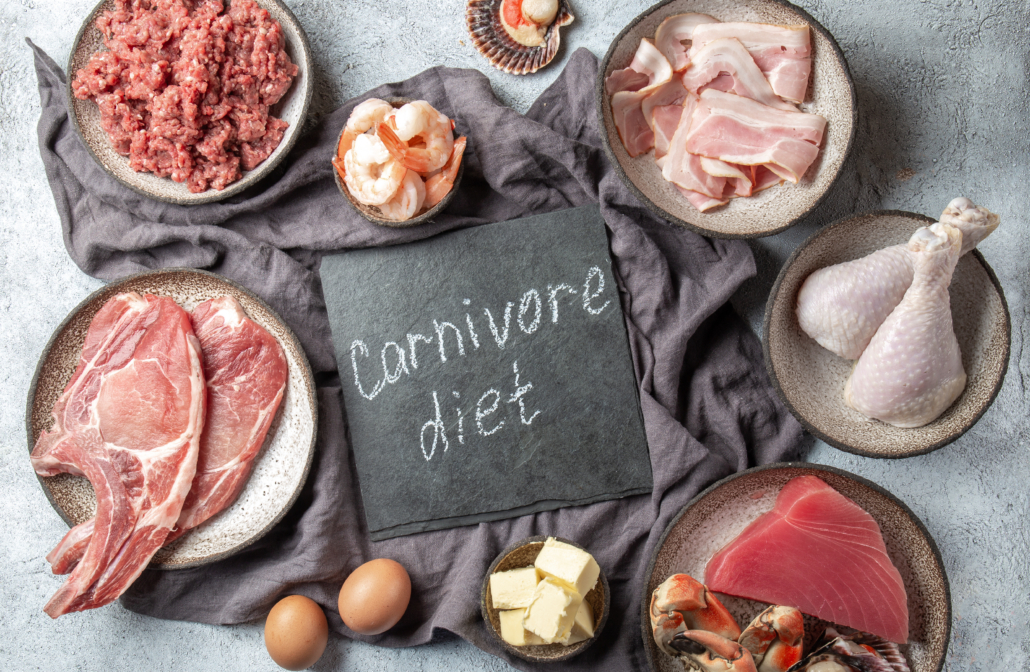We include products in articles we think are useful for our readers. If you buy products or services through links on our website, we may earn a small commission.
The Carnivore Diet for Depression
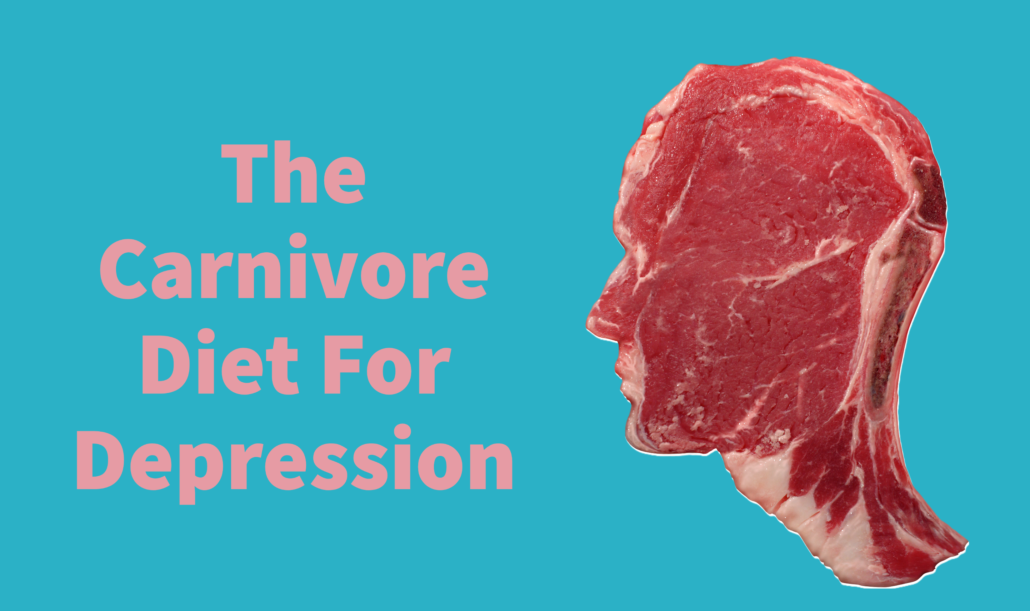
The all-meat “carnivore diet” is trending, thanks in part to influential adopters who have used it to resolve chronic depression along with many other issues affecting health and wellbeing.
In this article, we’ll look at these high-profile success stories, explore the science linking eating meat with lower incidences of depression, and highlight links between seed “vegetable” oil and increased depression.
Table of Contents
Carnivore Diet for Depression Success Stories
Studies show humans evolved on a diet of mostly meat for nearly 2 million years. Now, this way of eating is being resurrected as an antidote to the standard American diet. 1
Research is catching up with it, which means most of our data on the effects of the carnivore diet comes from personal reports and observations.
You don’t have to look hard to find powerful stories of mental and physical transformation. Among the success stories of high-profile adopters, the positive effects of a carnivore diet on depression and mental health are a common theme.
Let’s take a look at what these carnivore diet ambassadors can tell us about the effects of a carnivore diet for depression.
Mikhaila Peterson
Mikhaila Peterson, daughter of popular psychologist Jordan Peterson, used the carnivore diet to recover from a litany of debilitating mental and physical disorders, including bipolar disorder, hypersomnia, psoriasis, and Lyme disease.
She first heard of the diet when carnivores diet pioneer Dr. Shawn Baker, spoke about it on the Joe Rogan Experience podcast.
Mikhaila credits the carnivore diet with sending juvenile rheumatoid arthritis into remission and for her recovery from severe depression and anxiety that had been plaguing her since fifth grade.
Below, you can hear Mikhaila Peterson tell the story of how the carnivore diet helped heal her depression. In this interview, she details the steps and gives us an idea of how long it will take to get results.
Jordan Peterson
Mikhaila’s experience with the benefits of a carnivore diet was so powerful that she inspired her father, University of Toronto psychology Professor Jordan Peterson, to give it a try.
Like his daughter, Jordan Peterson had been suffering from chronic depression. He undertook a version of carnivore called the “Lion Diet.” This carnivore elimination diet calls for eating only red meat, salt, and water.
On the Joe Rogan podcast, Peterson shared how going carnivore resolved his anxiety and depression while boosting his mental sharpness. In addition to these mental benefits, he told Joe Rogan,,“I lost 50 pounds. My appetite has probably fallen by 70%. I don’t get blood sugar dysregulation problems. I need way less sleep…my gum disease is gone. Like, what the hell?”
Below you can watch Jordan Peterson describe the benefits he’s had by adopting a carnivore diet to Jo Rogan. You can read about his reports of alleviating depression, anxiety, psoriasis and gastric reflux in this Atlantic article.
Amber O’Hearn
Data scientist and science writer Amber O’Hearn began experimenting with the carnivore in 2008. Since then, she has credited the all-meat approach with resolving her bipolar depression and suicidal ideation, for which psychiatric medications had been ineffective.
O’Hearn has become a dedicated proponent of the carnivore diet, speaking widely and founding The Boulder Carnivore Conference.
She is one of the most thorough carnivore diet researchers. You can find her writing on her website here.
Watch Amber O’Hearn describe how the carnivore diet resolved her depression and boosted her mental energy.
Georgia Eade, Diagnosis Diet
One of the most respected proponents of a keto, low-carb high-fat, and carnivore lifestyle for mental health is psychiatrist Dr. Georgia Ede.
Eade had experimented with eliminating plant foods and increasing fatty animal foods for over a decade. Then, in 2018, she became a full carnivore.
Eade credits her low-carb journey to carnivore with reversing symptoms of fibromyalgia, chronic fatigue, migraines, and IBS.
Below, you can watch Georgia Eade speak about the psychological benefits of this way of eating.
Effects of Eating Meat on Depression: The Science
A brief look at the science supporting the benefits of simply eating meat for depression suggests that an all-meat carnivore diet would contribute even more significant benefits. And this is leaving aside the added benefits of eliminating all processed foods and plant toxins associated with depression.
The highest quality study revealing the link between meat and lower rates of depression was published in 2021 in the Journal of Food Science and Nutrition.

Here’s a rundown of the study:
- 20 studies with 171,802 participants, ages 11-105 years old, from North America, Europe, Asia, and Oceania
- Results included “a significant association between meat consumption/abstention and depression and anxiety”
- The more meat people ate, the lower their depression and anxiety levels
- Vegan and vegetarianism was linked to a significantly greater likelihood of depression and psychiatric disorders
- The results were true for both men and women
- The quality of the studies explained the differences between each study. The higher quality studies showed more significant effects of eating meat on reducing depression.
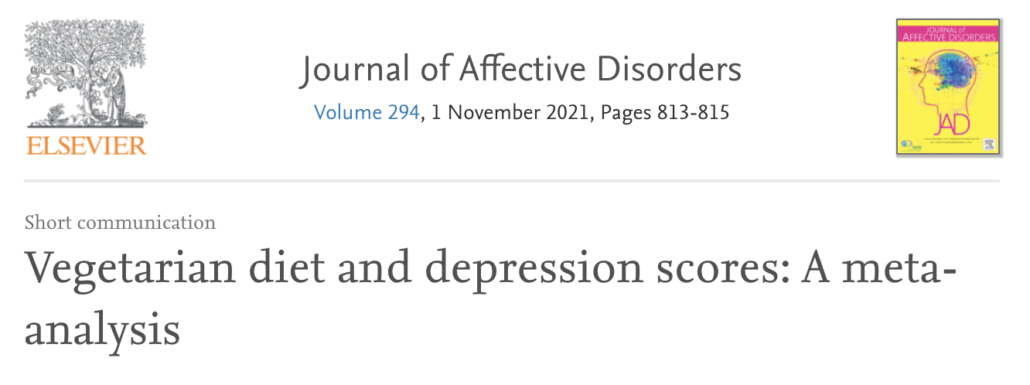
This illuminating 2021 meta-analysis published in the Journal of Affective Disorders found similar results to the study above. Here’s a rundown:
- 49,889 participants (8057 vegetarians and 41832 non-vegetarian controls) were included.
- The study controlled for urban/rural variables
- Vegetarians had significantly higher depression scores than non-vegetarians

This 2012 study gathered data from 4,116 Germans. The participants were either vegetarian, predominantly vegetarian, or non-vegetarian.
Participants were selected to equally represent numerous demographic and socioeconomic variables.
The researchers found that over the previous month, the previous year, and over their lifetimes, more vegetarians than meat eaters experienced depressive disorders.
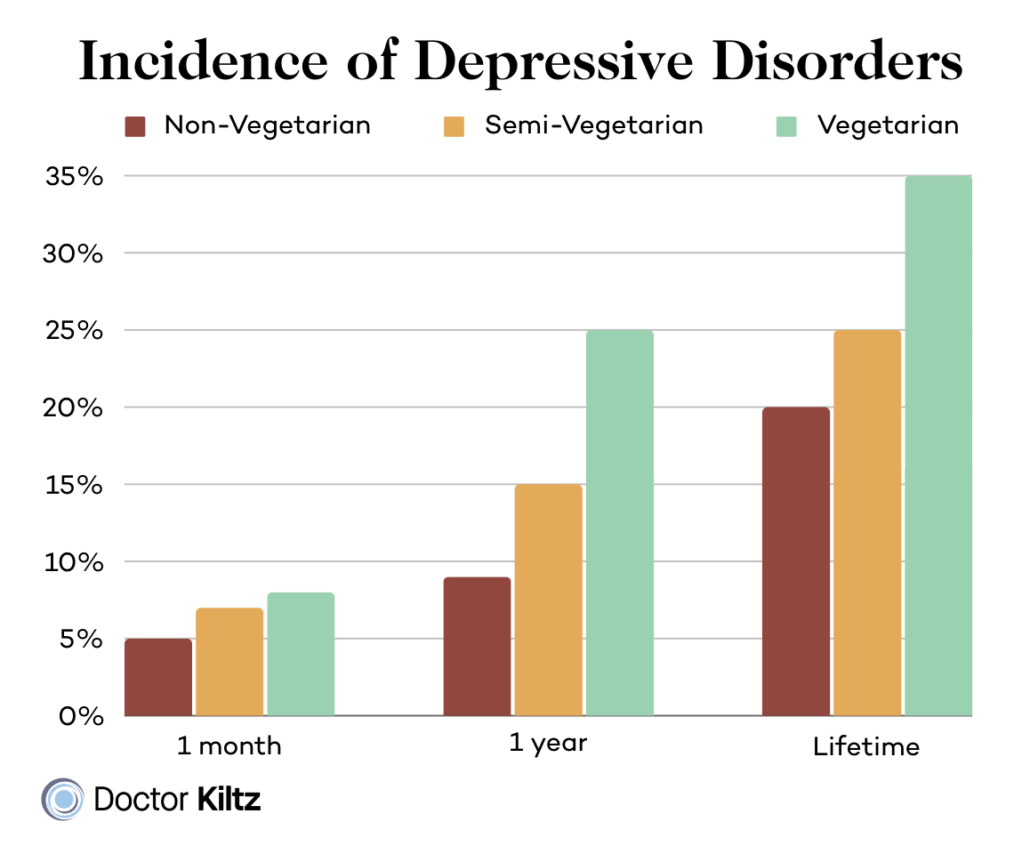
What Links Meat with Better Mood, Lower Incidences of Depression?
It’s worth noting that none of the studies above linked a specific reason why eating meat is associated with lower rates of depression.
But other studies reveal that meat and whole animal products provide an abundance of nutrients clinically studied for their mood-boosting and depression-busting properties.
Let’s take a look at a few of these key nutrients.
Vitamin B12
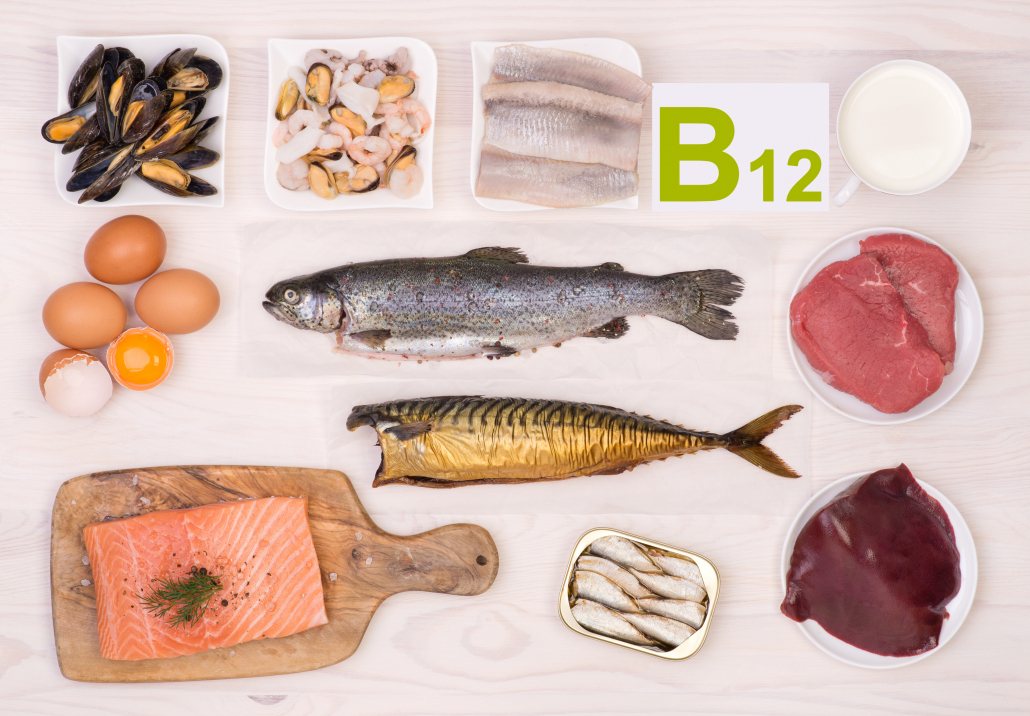
B12 is clinically shown to support mood and prevent depression.[7] [8] [9] [10]
It’s also a meat-specific nutrient, making it hard for vegans and vegetarians to get enough of. 5
Studies show how B12 deficiency leads to the death of neurons and neurotransmitter signaling that directly results in depression.
You can find a list of the top B12 foods here.
Carnivore diet foods are loaded with B12. Some of the foods with the highest B12 concentrations include :
- beef liver (2471% per 100 g)
- Oysters (324% per 3.5 oz)
- Ribeye steak (142% RDV per 227 g)
Zinc
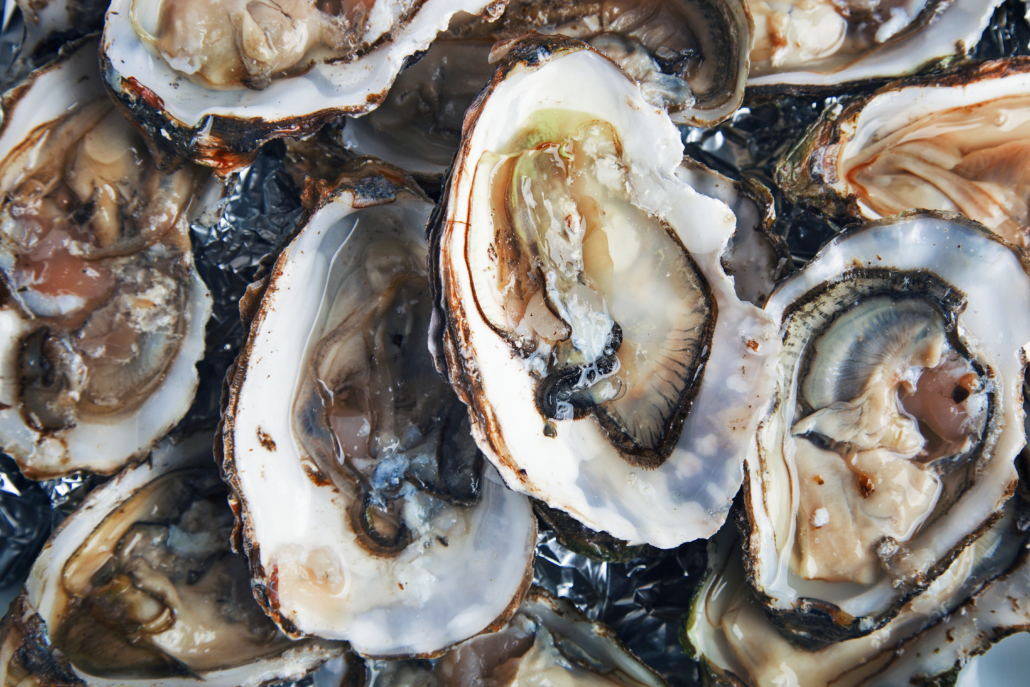
Zinc plays a crucial role in maintaining neuronal systems linked to positive mood and mental health.
Though you can get some zinc from a few plant foods–especially grains–it is far less concentrated and bioavailable when compared to zinc in animal products.
Grains that contain zinc also contain fiber and antinutrients like phytates that bind to zinc and inhibit digestive enzymes.
Not surprisingly, studies suggest a link between low zinc levels and depression.
Other studies reveal that zinc effectively reduces both depressive and psychotic symptoms.
On the carnivore, common foods like ribeye steak, and ground beef provide an abundance of zinc (per 100 grams). Top zinc foods include:
| Oysters | 90.8mg | 825% |
| Ribeye Steak | 11mg | 100% |
| Alaskan King Crab | 7.6mg | 69% |
| Spiny Lobster | 7.3mg | 66% |
| Lamb Shoulder | 7.3mg | 66% |
| Ground Beef (70/30) | 6mg | 54% |
Creatine
Creatine is another meat-specific nutrient that you get in abundance on a carnivore diet.
Recent studies reveal creatine as a promising nutrient for the treatment of depression.
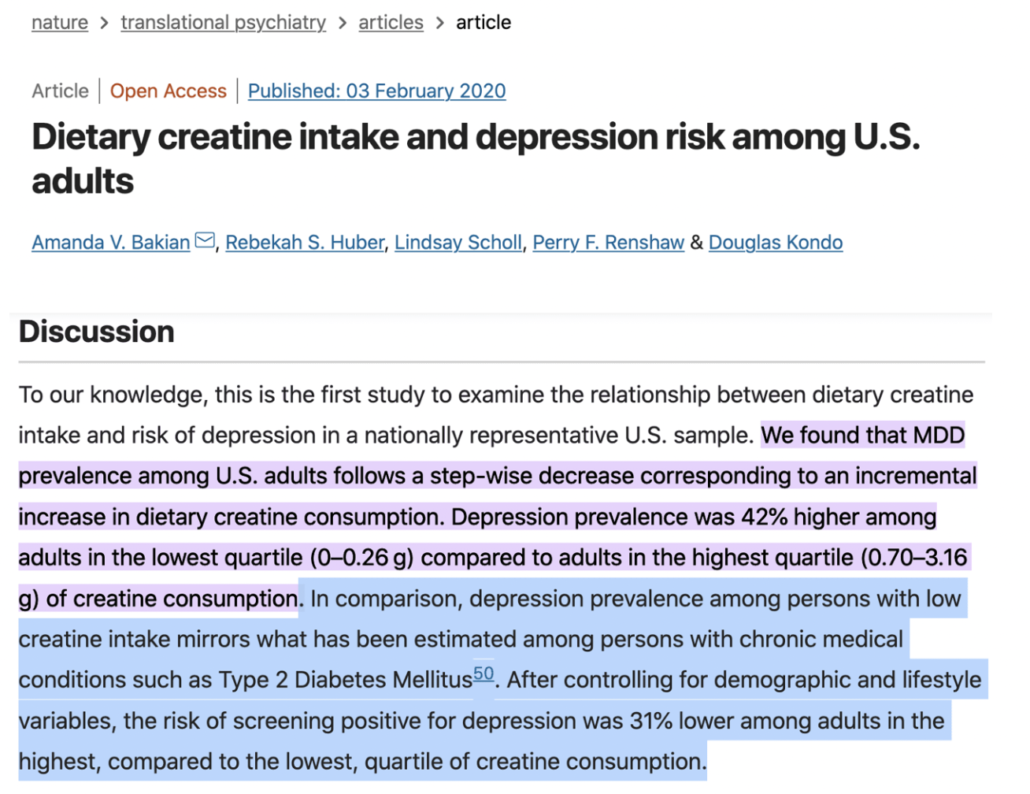
Most people can get plenty of creatine by consuming a carnivore diet centered around fresh, whole-animal foods.
Additionally, low creatine levels are significantly associated with increased levels of depression–which may be a key to the higher incidences of depression among vegetarians. 5
Taurine
Taurine is another depression-busting substance you get in abundance on a carnivore diet.
Studies show that taurine supplementation reduces mental health symptoms, including psychosis. At the same time, it boosts positive markers of mental health in young people who had experienced their first psychotic episode.
Foods high in taurine include shellfish, dark meat chicken, and red meat.
Eliminating Vegetable Oil
The carnivore diet may reduce depression due to what it eliminates as well as what it provides.
Though a newly emerging area of study, recent research links consuming vegetable oils high in omega-6 vegetable oils with mood disorders and depression.
In a study on monkeys fed a “Western diet” that included safflower oil, the most depressed monkeys had the highest blood levels of PUFAs.[21]
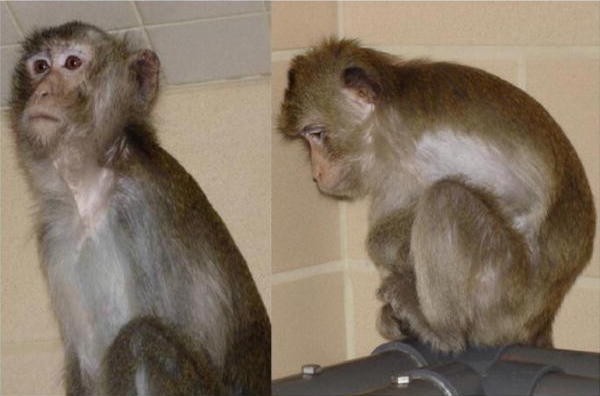
Source: Chilton FH, Lee TC, Willard SL, Ivester P, Sergeant S, Register TC, Shively CA. Depression and altered serum lipids in cynomolgus monkeys consuming a Western diet. Physiol Behav. 2011 Aug 3;104(2):222-7.
In 2019, Turkish researchers studied the effects of different fats, including sunflower oil, margarine, and traditionally made butter on mood and cognitive ability.
To measure the memory and learning abilities of experimental animals, they used a “direction-finding module.” And they used a rather cruel-sounding “water tank” method to determine the depression risk of the animals by measuring their survival motivation.1
These trials revealed the following striking results:
- When it came to figuring out where to go, Animals fed with enriched sunflower oil and margarine were stumped. The researchers concluded that sunflower oil has a negative effect on the brain’s decision-making ability.
- Peak depression levels were found in mice fed margarine.
- The best cognitive and mood results were observed in mice who ate traditionally made butter.
- The researchers commented that the butter-fed mice “had the lowest levels of anxiety and there were no symptoms of depression while the learning levels were extremely positive.”
Carnivore Diet for Depression: The Bottom Line
High-profile carnivore diet proponents, along with thousands of other all-meat enthusiasts, report that the carnivore diet has powerful anti-depressant properties.
And there are good science-backed reasons to believe these self-reports.
Studies comparing rates of depression between meat eaters and vegetarians routinely reveal that the more meat people eat, the less depressed they are.
Other studies tell us that specific compounds found in abundance in meat, such as B12, zinc, creatine, and taurine, are powerful antidepressants.
Other studies tell us that what the carnivore diet eliminates may be as important as the foods it provides. In an area of emerging science, vegetable oils, which are off-limits on the carnivore diet, have been strongly associated with cognitive impairment and depression.












